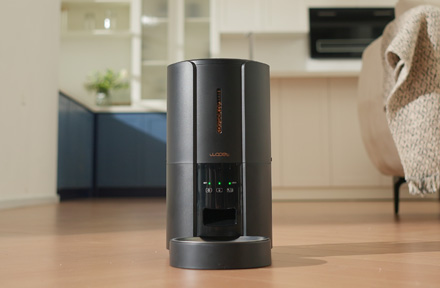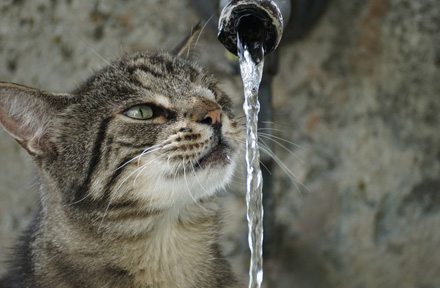Apr 28, 2025
Author:Amanda Lyu

When you address your feline companion do you question whether they can hear you or not? Cats usually involve themselves only with mealtime or sunbeams that spread across the floor because they tend to lose focus on outer reality. Yet, when you whisper the right word—perhaps their favorite treat—they suddenly lift their head.
This puzzling mix of indifference and sudden interest makes every cat owner ask: Do cats know their names, or are they simply responding to tone and timing? Let’s dive into what science and everyday stories tell us about our whiskered companions.
Cats charm us with their independent streak. They might curl up beside you one moment and stroll away the next. Many owners delight in sharing photos of their sleek black cat breeds that stride confidently through the house.
Yet, these graceful creatures can be masters of selective hearing, seemingly oblivious to calls or claps meant to grab their attention. This aloofness fuels the belief that cats know their names, or simply ignore them—unless, of course, a timed feeder clicks into action.
Do cats respond because they recognize the exact sound of their name, or is it a clever trick of association? When a cat twitches its ears at a familiar word, is that proof they understand it as “their” name, or are they reacting to the happy tone you use when you call them?
This mystery captivates researchers and pet parents alike, prompting experiments that blend psychology, acoustics, and a dash of feline whimsy to explore whether cats know their names or are attuned only to tone.
In the sections ahead, we’ll look at landmark studies probing feline name recognition, share real-life owner anecdotes, and walk you through simple training tips.
We’ll compare cats to dogs, explore how individual personality shapes responsiveness, and help you appreciate each cat’s unique flair. By the end, you’ll have a fuller picture of whether cats know their names, and how you can strengthen that connection.

In 2019, a team led by Atsuko Saito at Keio University in Japan set out to test whether cats can truly pick out their own names from other sounds. Researchers recorded the names of each cat, along with other words their owners often used, such as “treat” or “play.”
They then played back these clips to 78 cats in their homes, watching for ear twitches, head turns, or tail flicks. Remarkably, cats responded more often to their own name than to other words, suggesting that cats know their names, or at least their human-imparted labels.
Following the Japanese experiment, smaller studies in Europe and the US tried to replicate the results. One project at a busy shelter played recordings where cats had no prior conditioning, and still saw stronger reactions to names than to neutral sounds.
Another team found that in multi-cat households, confusion arose when names sounded similar. Together, these studies support the idea that cats know their names, though memory skills and environment can affect outcomes.
Cats boast a hearing range far beyond our own, picking up frequencies from around 48 Hz up to 85 kHz—while humans max out at about 20 kHz. This sensitivity helps them detect the faintest rustle of a mouse or the high-pitched beep of an electronic toy. That keen ear aids in distinguishing between different sounds, including slight variations in your voice when you call their name.
Cats learn by association. If calling their name precedes a fun play session or the click of a auto feeders and water fountains, they connect the sound to the reward. Over time, that link strengthens, so the name itself can trigger anticipation.
This conditioning underlies why even a sleepy cat might leap upright when they hear you open the treat jar or rattle their automatic pet feeder. It’s less about an abstract understanding of identity and more about sound bringing a positive outcome.

Countless cat lovers share quirky tales online. One owner recalls how their rescue tortoiseshell cats would never respond to her given name but came running when called “dinner.”
Another describes a road trip where the family’s Maine coon perked up at the sound of cats know their names before they even reached the car—a clear sign he connected the phrase with adventure (and perhaps treats).
And if you’ve ever wondered why your cat suddenly dashes when you crinkle the treat bag, check out tips on why your cat pooping on the bed—some cats respond to the promise of silence as much as the name itself.
Skeptics argue that what looks like name recognition might be a cat tuning into body language, tone, or a previous pattern of rewards.
If you always bend down and hold out a treat when you say “Milo,” the cat might react to the posture and offering hand far more than the word itself. It’s tricky to separate the name from the whole package of cues—our changes in facial expression, pitch, and posture all blend together.
Positive reinforcement lies at the heart of teaching cats to respond more reliably. Each time your cat clicks its head at the sound of their name, reward them immediately with a small treat or affectionate scratch behind the ears.
Over repeated sessions, this clear cause-and-effect helps them tune in to the exact word. Consistency is key—random rewards dilute the link between name and payoff.
1. Choose a quiet spot. Minimize distractions so your cat focuses on you instead of a running water fountain vs. bowl.
2. Use small treats. Tiny bits of kibble or their favorite snack work best—just enough to motivate without filling them up.
3. Speak clearly. Say the name in a steady, upbeat tone.
4. Keep sessions short. Two to three minutes per day prevents boredom.
5. Praise every success. Even a slight ear twitch earns a “good kitty” and a nibble.
With patience, you’ll notice your cat perks up more often—and you’ll see that cats know their names far better than you might think.
Dogs excel at name recognition because centuries of selective breeding honed their desire to please humans. They look to us for guidance, so they learn names quickly and respond eagerly. In contrast, cats evolved as solitary hunters.
They never needed to follow a pack leader, so they lack that intrinsic drive to obey. As a result, dogs often sprint to their name, while cats might saunter over at their leisure—if they come at all.
Cats were domesticated around 9,500 years ago, mainly for rodent control, not companionship. Humans valued their hunting skills, not obedience. Without a historical emphasis on following commands, cats retain a streak of independence. They’ll engage when they choose, sometimes ignoring their name if a sunny window perch or an idle vacuum cleaner seems more appealing.

Just like people, cats have unique personalities. Some are social butterflies, eager to interact, while others guard their space fiercely. Certain breeds, such as the friendly tabby cats or the vocal Siamese, may show more interest in human voices.
In contrast, aloof breeds like tortoiseshell cats might respond only when they please. Your cat’s environment—early socialization, exposure to hydration hacks, or experience with cat water fountains—also shapes responsiveness.
No two cats react the same way to their name. Some come at once, others take their sweet time, and some may never budge. Recognizing this helps you set realistic expectations and celebrate small wins.
Whether your feline friend perks up immediately or only when they spot a treat, it shows they’ve formed some link between that sound and something meaningful. In that sense, cats know their names, even if they don’t rush like a dog at the first call.
Recapping our journey, research from Japan to shelters worldwide indicates that cats can distinguish their names from other words. Anecdotes from owners—whether of a curious Maine coon or a reserved tortoiseshell—add color to this picture.
Training with positive reinforcement and smart feeding solutions sharpens name recognition, though cats’ independent nature and varied personalities mean responses will differ. While they may never rush like a spaniel, the subtle head tilt or flick of the ear tells you that—yes—cats know their names, but they choose how and when to show it.
Label:
Popular Post

What to Feed a Sick Dog With No Appetite? [2025 Guide]
May 16, 2023

Troubleshooting Common Issues with Automatic Pet Feeders: Tips & Tricks for Pet Owners
Oct 26, 2023

Why Does My Cat Cough After Drinking Water? 8 Potential Reasons
Mar 13, 2023

My Cat Only Eats A Little at A Time - What to Do?
Feb 27, 2023

Why is My Cat Throwing up Water? Top 5 Causes Here
Feb 08, 2023
$99.99
$129.99
Copyright © 2025 WOPET. All Rights Reserved.